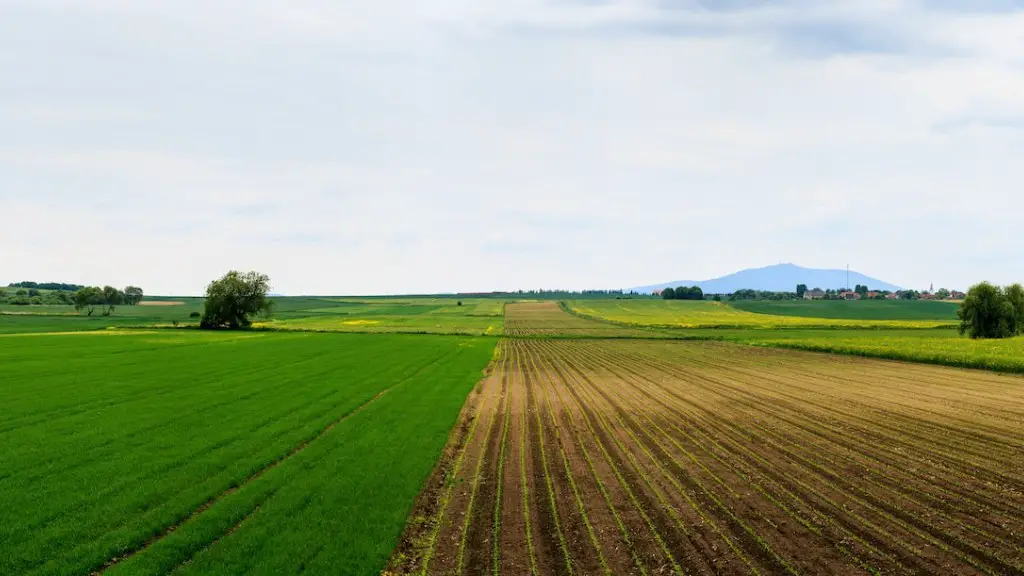Studying agriculture is a multi-faceted pursuit that requires knowledge in diverse areas. Key fields of study include biology, chemistry, economics, law, engineering, genetics, plant sciences, entomology, ecology, and agroecology. With this understanding of the complex landscape of agriculture study, it is easy to see why so many students pursue an academic focus in agriculture.
To graduate with a degree in agriculture, students must possess a broad base of knowledge in several subjects. Generally, biology forms the foundation of any agricultural curriculum. This includes genetics, microorganisms, and the study of living organisms and how they interact with their environment. In addition, students must understand basic chemistry concepts related to agriculture, such as agricultural engineering, soil management, and fertilizer production. Finally, courses in economics, law, and business are essential for any successful agricultural businessman.
Genetics plays an important role in the science of agriculture. Graduate students in the field should have an understanding of basic genetics, plant breeding, and the applications of new genomic technologies in agricultural production. They should also be well-versed in the theories underpinning crop improvement and the methods used to test those theories.
Interdisciplinary courses in agroecology must be included in an agricultural education. This involves an understanding of the processes governing agroecosystems, including their biological, chemical, physical, and socio-cultural components. Students should be familiar with the influence of climate and land use on agricultural systems, and the different practices used to optimize plant growth, such as tillage and irrigation.
Environmental sciences are an essential component of an agricultural education. Students should be aware of the types of fertilizer and soil treatments used in modern agricultural production, and the environmental consequences of their use. The impact of agricultural activities on air, water, and land resources should remain in the forefront of their studies, as well as the potential of emerging practices like biotic pest control and sustainable farming techniques.
Ultimately, agricultural studies demand proficiency in a diverse range of topics, from genetics and engineering to law and business principles. Students should possess basic knowledge in a wide range of science-related fields and actively consider the implications of agricultural production on the environment.
Chemistry In Agriculture
Chemistry plays an important role in the science of agriculture. Although some of the applications of chemistry to agriculture are well-known and widely used, others are more specialized and require more precise knowledge. For instance, the understanding of the chemical interactions between soil and nutrients, and between plants and their environment, is essential for any professional involved in agricultural production.
The use of fertilizers to boost plant growth is one of the common applications of chemistry in agriculture. While some fertilizers are natural and can help improve soil quality, they are often not sufficient to provide plants with the nutrients they require. In this case, chemical fertilizers are required to supplement their deficiencies. Chemists must understand the different chemical elements and how they interact in order to determine which fertilizer blend is best suited to a given area of agriculture.
Chemical pesticides are another application of chemistry that is widely used in agriculture. Here, chemists must consider a variety of factors, including the type of pests, the desired level of crop protection, and the environmental impacts associated with the use of these pesticides. For instance, some chemicals may stay in the environment for a long time and may cause harm to both animal and plant life.
In addition to fertilizers and pesticides, chemists are also involved in the development of new agricultural technologies. Such technologies range from biosensors and genetic engineering, to mechanical engineering applications, and other innovative solutions for agricultural production. Chemists must have a solid understanding of the latest breakthroughs in the field of agricultural chemistry in order to properly analyze and develop new tools and technologies.
The knowledge of chemistry is essential for anyone involved in agricultural production. By possessing a comprehensive knowledge of the different chemical elements and interactions related to agriculture, professional chemists can properly evaluate and make decisions related to the use of fertilizers and pesticides, as well as the implementation of new technologies in agricultural production.
Biology In Agriculture
Biology forms one of the foundations of an agricultural education, particularly in understanding the relationships between plants, their environments, and the animals that inhabit them. Courses in genetics, microorganisms, living organisms, and environmental interactions are all essential components of any agricultural curriculum.
Genetics is especially critical in understanding the roles of genes, mutations, and their effects on the growth and development of plants. Through genetic engineering, chemists can manipulate the DNA of plants, allowing for greater control over the characteristics of a variety of crops. Furthermore, students must understand the dynamics of plant breeding and the principles of plant improvement in order to develop stronger and more resilient crops.
In addition, students should understand the basic features of microorganisms and their interactions with the environment. This includes an awareness of the effects of bacteria, fungi, and viruses on soil fertility and plant growth. Furthermore, detailed knowledge about the interactions between insects and plants is necessary for any successful agricultural scientist.
Finally, biologists must also understand the principles of ecology, which study the relationships between different organisms and their environment. This knowledge is key for learning about conservation and sustainable farming methods, as well as for analyzing the impact of human activities on the natural world.
The integration of biology into the study of agriculture is essential for the development of effective and sustainable practices in the field. To fully understand the principles of agricultural production, students must possess a comprehensive knowledge in the areas of genetics, microorganisms, and ecology.
Economics In Agriculture
Since agriculture is as much an industry as it is a science, economics is an important element of an agricultural education. Students must possess a thorough understanding of the principles of economics and its application to agriculture in order to make informed decisions.
A solid grasp of the fundamentals of supply and demand is a prerequisite for any academic success in agriculture. The pricing of agricultural products is a complex and often controversial area, where the balance between market forces and the need for government intervention can be difficult to establish.
In addition, students must understand the concepts of production efficiency and cost-benefit analysis in order to optimize resources and make the most of their agricultural operations. For instance, decisions such as fertilizer use, land use, and water resources must be based on sound economic principles in order to achieve a financial benefit in the long-term.
The international nature of agricultural markets requires an understanding of economic principles on a global scale. In particular, students should have a deep understanding of international trade and its role in the agriculture industry. This includes basic knowledge of the different types of tariffs, subsidies, and other governmental programs, as well as their implications on the production and sale of agricultural products.
Ultimately, economics plays an important role in the successful application of agricultural knowledge. Students should develop a full understanding of the economic principles and their application to effective agricultural production and management, in order to properly allocate resources and ensure profitable agricultural operations.
Law In Agriculture
The study of law is a crucial part of an agricultural education. Students must be familiar with the numerous laws and regulations that govern the industry in order to adhere to the highest legal standards. Furthermore, knowledge in law is essential for the successful management of agricultural enterprises.
One of the key areas of law related to agriculture is the regulation of crop production. This includes knowledge of the requirements for proper cultivation, land-use policies, and the processes required for obtaining permits and licenses. In addition, students should be knowledgeable about the restrictions imposed by international trade agreements, food safety requirements, and animal rights standards.
The importance of contracts in the agricultural business cannot be overstated. Students should understand the various types of contracts used in the industry, such as leases, land sales, and livestock agreements. Furthermore, they must be familiar with the legal principles governing the creation, termination, and enforcement of such contracts.
Another key area of law relates to the taxation of agricultural products and operations. Agricultural producers must be aware of the various income and property taxes applicable to their operations and livestock, as well as the implications of any changes in those laws.
Legal knowledge is essential for any successful agricultural business. Students need to possess a comprehensive understanding of the laws and regulations applicable to agriculture, in order to properly manage their operations and comply with the highest standards.
Engineering In Agriculture
Engineering plays an important role in modern agricultural production. Students must understand the basics of mechanical, structural, and electrical engineering, in order to effectively make use of the latest technologies in agricultural production.
The implementation of new engineering technologies poses numerous challenges for agricultural professionals. Students must be familiar with the principles of machine design and operation, in order to properly evaluate and choose the best tools and techniques for a given operation.
Moreover, knowledge in engineering is essential for the development of new agricultural technologies. Such technologies range from irrigation systems, crop protection systems, and agricultural robots, to sensors and biosensors. In each case, engineers must understand the underlying technology in order to develop and maintain an effective system.
Irrigation engineering is one of the key areas of engineering that is essential for successful agricultural production. Understanding the principles of hydraulic engineering and the dynamics of water flow is essential for the installation and operation of any irrigation system.
In addition, knowledge in electrical engineering is important for the development of efficient agricultural equipment. Electrical engineers must understand the design and operation of motors, energy-generation systems, and energy-storage systems, in order to properly maintain and troubleshoot agricultural equipment.
Engineering is thus an indispensable part of any successful agricultural operation. Students must understand the different engineering principles and technologies, in order to properly make use of the latest technologies and develop innovative solutions to optimize agricultural production.





